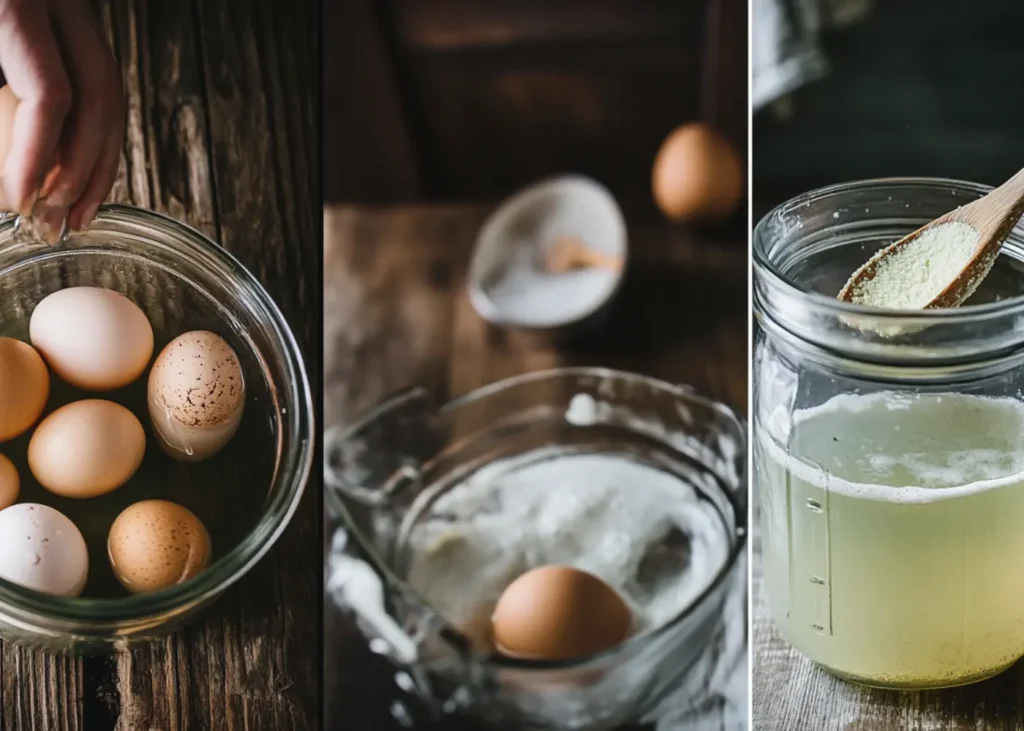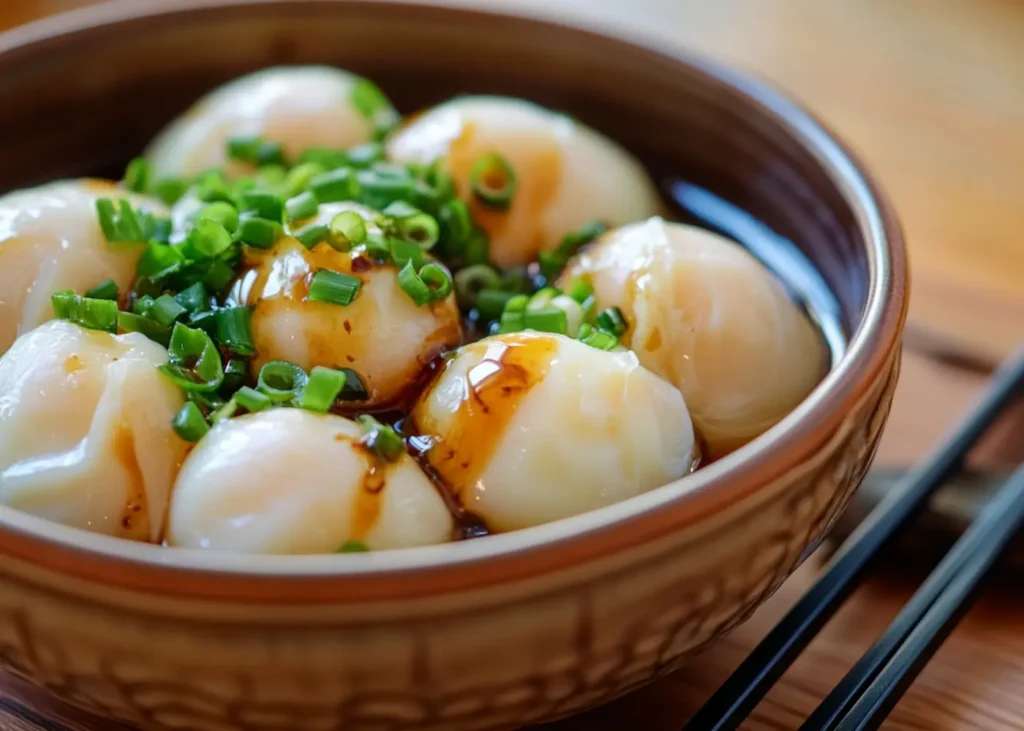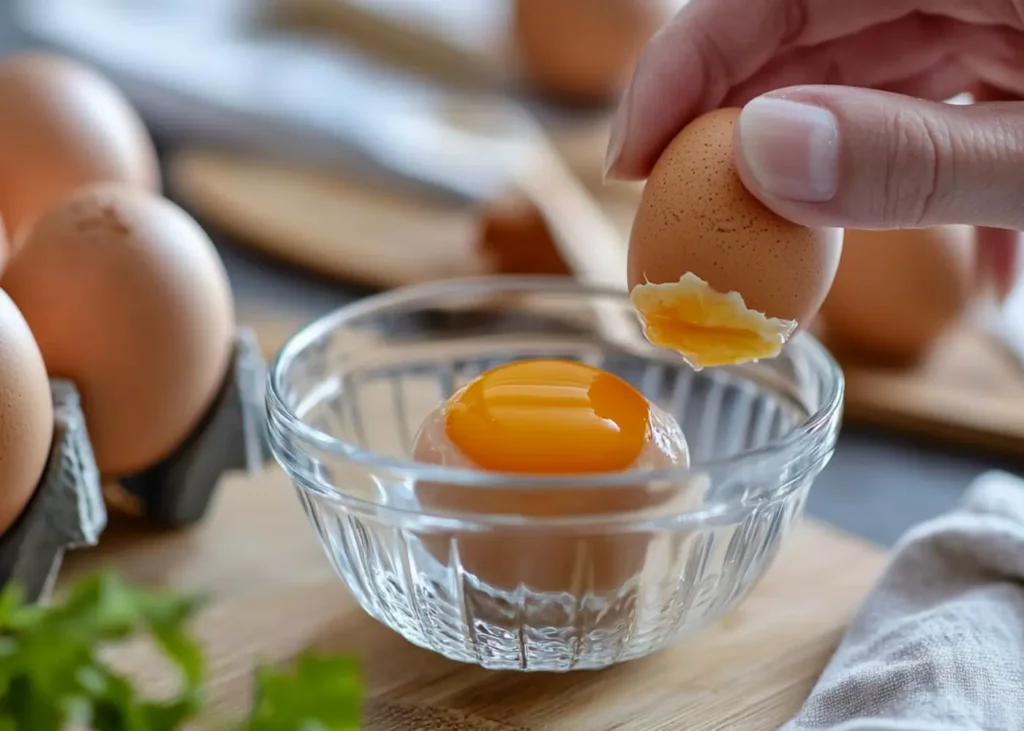Water glass eggs are a fantastic way to keep eggs fresh for months. Imagine having eggs on hand all winter, just like people did before refrigerators were common. This method, using a mix of water and pickling lime, has been around for years. It’s easy, and you don’t need fancy tools or equipment to make it work.
Let me tell you why this method is so handy. For example, it keeps your eggs fresh without changing how they taste or feel. Additionally, it’s super affordable since you only need three things: fresh eggs, water, and lime. Plus, it’s perfect for those times when eggs are harder to find or prices are through the roof. It’s like having a secret stash of fresh eggs waiting for you!
Compared to other ways of storing eggs, water glassing feels like the simplest choice. Freezing eggs changes their texture and flavor, and it takes up freezer space. Similarly, drying or salting eggs can leave them tasting very different. But with water glass eggs, you get the same fresh taste, even months later. In short, it’s a smart, old-school trick that still works perfectly today.
Table of Contents
What Are Water Glass Eggs?
Water glass eggs might sound fancy, but they’re really just a way to keep eggs fresh for a long time. This method has been around for years and was used before people had refrigerators. It’s simple, affordable, and works like a charm. If you’ve never heard of it, don’t worry—it’s easier than you think!
The process of water glassing is surprisingly straightforward. You take fresh, unwashed eggs and store them in a mix of water and pickling lime. The lime creates a seal around the eggshells, keeping air and bacteria out. Additionally, it preserves the eggs’ flavor and texture, so they stay just like fresh ones for months. It’s like giving your eggs a protective coat!
What can you do with these eggs? For example, you can use them in any recipe that calls for fresh eggs. They’re perfect for baking cakes, making omelets, or scrambling for breakfast. In short, water glass eggs are a reliable way to have fresh-tasting eggs ready whenever you need them. Whether you bake a lot or just love cooking, this method can make your life easier.
Ingredients and Tools for Water Glassing Eggs
Before you start water glassing eggs, you’ll need a few basic things. The process is simple, but having the right items makes it even easier. Let’s take a look at what you’ll need to get started!
Essential Ingredients
- Fresh, unwashed eggs: The eggs must have their bloom intact. The bloom is a natural coating that keeps out germs and helps the eggs stay fresh.
- Hydrated lime or sodium silicate: These are used to make the solution for storing the eggs. Hydrated lime, often called pickling lime, is easy to find and works great.
- Filtered water: Use clean water to avoid adding anything that might spoil the eggs.
Tools You’ll Need
- Airtight containers or food-safe buckets: These will hold the eggs and the solution. The container must seal tightly to keep the eggs fresh.
- Measuring cups and spoons: You need these to get the right mix of lime and water. Using the right amounts is very important.
- Stirring tools: A spoon or whisk will help mix the lime and water until smooth.
Additionally, work in a clean space to keep everything fresh. For example, wash and dry your containers and tools before using them. In short, with these simple ingredients and tools, you’ll be ready to water glass your eggs and enjoy fresh ones for months!

How to Water Glass Eggs: Step-by-Step Guide
Water glassing eggs is an old and simple way to keep eggs fresh for months. It may seem tricky at first, but it’s actually easy when you follow these steps. Let’s get started!
Preparation
Pick fresh, unwashed eggs with no cracks. The bloom, or natural coating on the shell, must stay intact. This coating keeps germs out and helps the eggs stay fresh.
To clean your eggs, use a soft cloth or brush to gently wipe off dirt. Avoid washing the eggs with water, as it can remove the bloom and reduce freshness. Handle the eggs carefully to avoid breaking them.
Mixing the Solution
After that, mix your water glassing solution. If you’re using hydrated lime, combine one ounce of lime with one quart of filtered water. Stir well until the lime dissolves completely. If you choose sodium silicate, follow the same ratio for the best results.
The solution should look smooth without lumps. If any lime settles at the bottom, stir it again before adding the eggs. Always use clean, filtered water to prevent any dirt or germs from getting into the solution.

Storing Eggs in the Solution
Now it’s time to store your eggs. Gently place the eggs into your container with the smaller end facing downward. This helps keep the yolks centered and fresh.
Pour the solution over the eggs until they are fully covered. Leave about an inch of space at the top of the container. This extra space allows the solution to expand slightly. Seal the container tightly to keep out air and germs.
Maintenance
After storing your eggs, check them now and then to make sure they’re still covered by the solution. If the water level drops, add more of the same mix to keep them fully submerged.
When you’re ready to use the eggs, take them out gently and rinse them with clean water. Always crack the egg into a separate bowl before cooking to check for spoilage. If it smells bad or looks odd, throw it away to stay safe.
In summary, water glassing eggs is a simple and useful way to keep them fresh for months. With the right steps and care, you’ll always have eggs ready for cooking or baking!

Recipes Featuring Water Glass Eggs
Water glass eggs are simple to use and work well in many recipes. They taste fresh and have the same texture as eggs straight from the farm. Below are a few easy recipes to try at home.
Chinese Steamed Eggs
This is a smooth and soft dish that’s great for any meal. It’s simple to make and uses basic ingredients.
Ingredients:
- 2 water glass eggs
- 1 cup of water
- A pinch of salt
- Soy sauce for flavor
Instructions:
- Crack the eggs into a bowl and mix them gently.
- Add water and salt, then stir until smooth.
- Strain the mixture into a heatproof bowl and cover it with foil.
- Steam on low heat for 10–12 minutes.
- Add soy sauce on top before serving.
This recipe is quick and makes a delicious, light dish.
Korean-Style Steamed Eggs
This dish is fluffy and full of flavor. It’s a great option for breakfast or as a side dish.
Ingredients:
- 3 water glass eggs
- 3/4 cup of water or broth
- A pinch of salt
- Sesame oil for flavor
Instructions:
- Whisk the eggs and water or broth until mixed well.
- Pour the mixture into a small pot and cook on low heat.
- Stir gently until the eggs become fluffy and soft.
- Add sesame oil on top for extra flavor before serving.
This dish pairs well with rice or noodles for a tasty meal.
Poached Eggs with Water Glass Eggs
Poached eggs are a classic choice for breakfast. Water glass eggs work well for this recipe and taste just as fresh.
Ingredients:
- 2 water glass eggs
- 1 tablespoon of vinegar
- Water for boiling
Instructions:
- Heat water in a pot until it starts to simmer. Add vinegar.
- Crack an egg into a small bowl, then gently slide it into the water.
- Cook for 3–4 minutes, then take it out with a slotted spoon.
Serve the eggs on toast, salads, or any dish of your choice.
Pro Tips for Success with Water Glass Eggs
Water glass eggs are easy to use, but these tips can help you avoid problems and get the best results every time.
Common Mistakes to Avoid
- Do not wash the eggs before water glassing, as it removes the protective coating.
- Use clean, filtered water to mix the solution to keep it safe.
- Make sure the eggs are completely covered in the solution at all times.
How to Check if Eggs Are Safe
Before using a water-glassed egg, check it for freshness. Place the egg in a bowl of water. Eggs that float are no longer fresh and should not be used. Those that sink can be cracked into a separate bowl to check for smell and color. Throw away any eggs that smell bad or look strange.
Adjusting Recipes for Texture Changes
Water glass eggs can feel a little firmer than fresh ones. For scrambled eggs, add a small amount of milk or water to make them softer. For baking, whisk the eggs well before adding them to your recipe. These small steps can make a big difference in your dishes.
In summary, water glass eggs are a simple and smart way to store eggs for months. With these tips, you can enjoy fresh-tasting eggs in all your favorite recipes.
Nutrition Facts of Water Glass Eggs
Water glass eggs keep their nutrients even after being stored for months. They are just as healthy and fresh as regular eggs. Below is a simple look at their nutrition:
| Nutrient | Value per Large Egg |
|---|---|
| Calories | 70 |
| Protein | 6 grams |
| Fat | 5 grams |
| Vitamin D | 1 mcg |
| Choline | 147 mg |
| Selenium | 15 mcg |
Health benefits: Eggs are full of protein and healthy fats, which help you stay full. They also contain vitamins like vitamin D that support your bones and selenium, which helps your immune system. Water glassing keeps all of these nutrients intact, making it a great option for storing eggs.
Serving and Storage Suggestions
After removing water glass eggs from the solution, you can use them just like fresh eggs. Here are a few easy ideas:
Scrambled Eggs
Mix water glass eggs with a little milk and cook them in a pan. They turn out fluffy and tasty, perfect for a quick breakfast.
Baking Recipes
Use them in cakes, muffins, or cookies. Whisk the eggs well before adding them to your batter for the best results.
Hard-Boiled Eggs
Boil the eggs for 9–12 minutes for a snack or to use in salads. The flavor of water-glassed eggs stays the same as fresh eggs, making them perfect for boiling.
Storage Tips
Once you take the eggs out of the solution, rinse them with clean water and put them in the fridge. Use them within a week for the best taste. Avoid leaving them at room temperature for too long, as it may reduce their freshness.
FAQs About Water Glass Eggs
How long do water-glassed eggs last?
Water-glassed eggs can last up to 12 months if kept in a cool, dark place. Check regularly to ensure they stay covered by the solution.
Do water-glassed eggs taste different?
No, water-glassed eggs taste just like fresh eggs. Their flavor and texture stay the same, which makes them great for cooking and baking.
What are the pros and cons of water glassing eggs?
Pros: Water glassing is affordable, easy, and keeps eggs fresh for months. It also keeps their flavor and texture intact.
Cons: It requires unwashed eggs, which can be hard to find. Also, the eggshells may feel a bit firmer after storage.
Should you wash farm-fresh eggs before water glassing?
No, do not wash farm-fresh eggs before water glassing. Washing removes the natural bloom, which protects the eggs from germs and helps them stay fresh.
How do you tell if water-glassed eggs are bad?
Put the egg in a bowl of water. If it floats, it is no longer fresh. If it sinks, crack it into a bowl to check the smell and look. Eggs that smell bad or look strange should not be used.
What is the best container for water glassing?
Use a food-safe container like a glass jar or food-grade bucket. These keep the solution sealed and stop air or germs from reaching the eggs.
Cultural Context and History of Egg Preservation
Keeping eggs fresh has been a common practice for hundreds of years. Before refrigerators, people around the world found simple ways to store eggs. These methods helped families have eggs even when hens stopped laying during colder months.
For example, in many Asian countries, people use salt to preserve eggs. The salt creates a coating that keeps the eggs fresh and adds flavor. Similarly, in colder regions, people stored eggs in cool, dark places to make them last longer.
The Amish community in the United States has been using water glassing for many years. This method helps them keep eggs fresh without needing electricity. Additionally, this technique has become popular among modern homesteaders who prefer natural ways to store food.
Troubleshooting Water Glass Eggs
Even though water glassing eggs is easy, problems can sometimes happen. Here are common issues and simple fixes:
Why Are My Water-Glassed Eggs Watery?
If your eggs feel watery or soft, the solution may not have been mixed well. For example, if the lime did not fully dissolve, the eggs might not be protected. To fix this, make a fresh batch of lime and water. Stir it well until it is fully blended, and replace the old solution with the new one.
How to Fix a Spoiled Batch
If you notice a bad smell or see mold in the container, the batch is likely spoiled. In this case, remove all the eggs and check each one. Discard any eggs that float or have a bad smell. Clean the container thoroughly with warm, soapy water before starting again. Additionally, make sure the eggs are always fully covered by the solution to prevent future problems.
Sustainable Cooking with Water Glass Eggs
Water glassing is not just about keeping eggs fresh. It also helps reduce food waste by giving eggs a longer shelf life. Instead of throwing away unused eggs, this method lets you save them for later use.
Additionally, water glassing is a budget-friendly solution for people who raise chickens or buy eggs in bulk. It saves money by reducing waste. For instance, if you’re someone who cares about the environment, this is an easy way to support eco-friendly cooking while saving money.
In short, water glassing is great for reducing waste and saving money. It’s good for your kitchen and the planet!
Give Water Glassing Eggs a Try
Water glassing eggs is a simple and time-tested way to keep eggs fresh. Whether you want to store eggs for baking, cooking, or just saving for later, this method is worth trying.
Additionally, we’d love to hear from you! Have you tried water glassing eggs before? Share your experiences in the comments below. For instance, let us know what worked for you or share any tips you have for others.
If you enjoyed this guide, share it with friends or family who love cooking or preserving food. Let’s spread the word about this easy and effective method!

